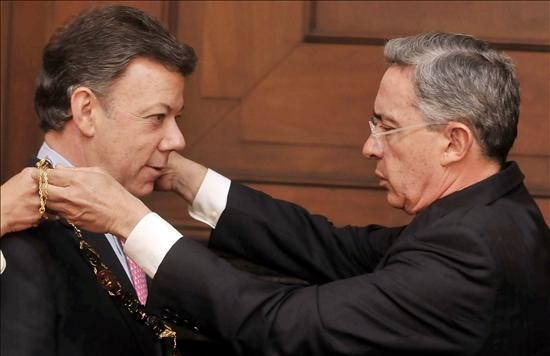A Consensus for Peace
This post is also available in: Español
 Globovisión / CC BY-NC 2.0
Globovisión / CC BY-NC 2.0
There are great expectations around President Juan Manuel Santos’s visit—with Pastrana? with Uribe?—to Washington to commemorate one of the greatest successes in US foreign policy: Plan Colombia, which made the ongoing talks to end the conflict possible.
The plan enjoyed bipartisan support in the United States, although there was some disagreement from the European Union, which had an impact in Colombia. Now, though, national consensus about what has been agreed to in Havana is lacking. The question is whether that missing consensus will also be reflected at the meeting in the White House.
Pope Francis’ scheduled visit to Colombia is another highly hopeful event regarding the construction of that consensus. Perhaps we should consider the consequences of the country splitting in half around the most basic governance principles; a new sectarianism; a breaking of the very social contract that makes a society possible. How can it be that this fracture is the result of the successful policy of two allies, the United States and Colombia?
It would be marvelous if President Obama’s invitation had a meaning beyond historical commemoration. Think tanks in Washington—which were so vocal during the debates about Plan Colombia—could have an important role, in particular the Inter-American Dialogue. Together with the prestigious Council on Foreign Relations (CFR), the Dialogue issued a very relevant document, titled “Toward Greater Peace and Security in Colombia, Forging a Constructive U.S. Policy." Michael Shifter—now president of the Dialogue—was the director of the project, chaired by then-Senator Bob Graham and former National Security Advisor Brent Scowcroft. At the time, Peter Hakim and Lelie H. Gelb were presidents of the Dialogue and the CFR, respectively.
The members of this working group represented diverse visions and experiences. They were diplomats, politicians, businessmen and women, academics, former members of the Armed Forces. Lee Cullum and Karen de Young, well-informed journalists, served as observers. And from the Colombian side, high profile figures—many instrumental in governance prior to Plan Colombia and during its implementation, including future presidents Santos and Uribe—advised the project.
The document provides diagnostics and recommendations, one of them visionary: “High-level and constructive U.S. involvement in Colombia can begin to help reverse Colombia’s deterioration. Colombia should be regarded as a top foreign policy priority. Stronger U.S. leadership is needed... U.S. policy toward Colombia needs to be multitrack, including military along with social, political, and economic components… This will best contribute to the overriding goal of peace and reconciliation in Colombia.”
For years, the Dialogue held a special group on the Colombian situation. The famous op-ed by then-Secretary of State Madeleine Albright on August 10, 1999—during Ambassador Pickering’s important mission to Colombia—was another fundamental piece of that strategy.
How helpful it would be if these institutions were to assist again, building the consensus needed for this peace process to be a base for a new Colombia.



















